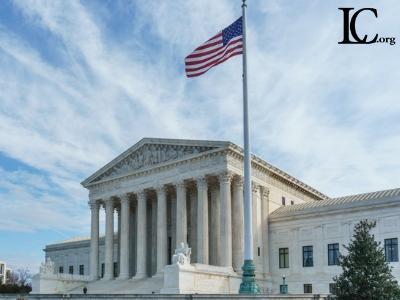The U.S. Supreme Court ruled 6-3 today in favor of a Denver-area website designer who was subject to a Colorado state law that censors and coerces the speech of creative professionals whose religious beliefs do not conform to state accepted beliefs.
In 303 Creative v. Elenis, the High Court ruled that the First Amendment bars Colorado’s Anti-Discrimination Act from forcing Lorie Smith, a website designer, to create expressive designs speaking messages with which the designer disagrees.
Through her business, 303 Creative, Smith creates unique and beautiful websites for her clients. Smith named her business “303 Creative” because “303” is the Denver metro area code. Smith serves everyone but cannot use her design skills and creativity to express messages that violate her deeply held religious beliefs. However, under Colorado’s Anti-Discrimination Act, Smith could be punished simply for offering to create websites only celebrating weddings consistent with her beliefs that marriage is between one man and one woman.
Justice Neil Gorsuch wrote the opinion, joined by Chief Justice Roberts, and Justices Alito, Thomas, Kavanaugh, and Barrett. Justice Sotomayor dissented, joined by Justices Kagan and Jackson.
In the High Court’s opinion, Justice Gorsuch masterfully explains why the First Amendment protects individuals whose ideas some may find repugnant, and that it precludes the government from forcing a message on a speaker who is unwilling—even in the provision of services.
“The First Amendment protects an individual’s right to speak his mind regardless of whether the government considers his speech sensible and well intentioned or deeply ‘misguided,’ and likely to cause ‘anguish’ or ‘incalculable grief,’ Equally, the First Amendment protects acts of expressive association. Generally, too, the government may not compel a person to speak its own preferred messages. Nor does it matter whether the government seeks to compel a person to speak its message when he would prefer to remain silent or to force an individual to include other ideas with his own speech that he would prefer not to include. All that offends the First Amendment just the same,” wrote Justice Gorsuch.
“Applying these principles to this case, we align ourselves with much of the Tenth Circuit’s analysis. The Tenth Circuit held that the wedding websites Ms. Smith seeks to create qualify as ‘pure speech’ under this Court’s precedents. We agree. It is a conclusion that flows directly from the parties’ stipulations. They have stipulated that Ms. Smith’s websites promise to contain ‘images, words, symbols, and other modes of expression.’ They have stipulated that every website will be her ‘original, customized’ creation. And they have stipulated that Ms. Smith will create these websites to communicate ideas—namely, to ‘celebrate and promote the couple’s wedding and unique love story’ and to ‘celebrate and promote’ what Ms. Smith understands to be a true marriage.”
“We part ways with the Tenth Circuit only when it comes to the legal conclusions that follow. While that court thought Colorado could compel speech from Ms. Smith consistent with the Constitution, our First Amendment precedents laid out above teach otherwise.”
Liberty Counsel filed an amicus brief in the case and presented the fact that artistic expression is pure speech that is fully protected by the First Amendment and must be protected from censorship or compulsion, particularly when the message is an unpopular one. This applies even when speakers are compensated for artistic expression. The protected artistic expression includes, among other things, books, plays, films, video games, music, painting, poetry, drawings, engravings, sculptures and photography. This also includes website creation and content as pure speech since websites can provide a powerful way for private citizens to make their voices heard.
The High Court agreed with Liberty Counsel’s argument.
“Nor is it any answer, as the Tenth Circuit seemed to suppose, that Ms. Smith’s services are ‘unique.’ In some sense, of course, her voice is unique; so is everyone’s. But that hardly means a State may coopt an individual’s voice for its own purposes. In Hurley, the veterans had an ‘enviable’ outlet for speech; after all, their parade was a notable and singular event. In Dale, the Boy Scouts offered what some might consider a unique experience. But in both cases this Court held that the State could not use its public accommodations statute to deny speakers the right ‘to choose the content of [their] own message[s].’ Were the rule otherwise, the better the artist, the finer the writer, the more unique his talent, the more easily his voice could be conscripted to disseminate the government’s preferred messages. That would not respect the First Amendment; more nearly, it would spell its demise.”
Justice Gorsuch also cites Liberty Counsel’s unanimous victory on behalf of the Christian flag in the Shurtleff v. City of Boston case.
“All manner of speech—from ‘pictures, films, paintings, drawings, and engravings,’ to ‘oral utterance and the printed word’—qualify for the First Amendment’s protections; no less can hold true when it comes to speech like Ms. Smith’s conveyed over the Internet.” Kaplan v. California, see also Shurtleff v. Boston.”
“Instead, as we have seen, the First Amendment extends to all persons engaged in expressive conduct, including those who seek profit (such as speechwriters, artists, and website designers). If anything is truly dispiriting here, it is the dissent’s failure to take seriously this Court’s enduring commitment to protecting the speech rights of all comers, no matter how controversial—or even repugnant—many may find the message at hand,” wrote the High Court.
Smith started her business in 2012 to exercise creative freedom. Yet Colorado’s law would force her to use her artistic web design skills to speak messages celebrating “same-sex marriage.” In addition, the law acts as a gag order that prevents Smith from expressing on her website the reasons why she only creates messages celebrating certain ideas. Ironically, Colorado’s public-accommodation law allows secular artists but not religious ones like Smith to make “message-based refusals.”
Smith filed a lawsuit in 2016 in federal court. Nearly three years later, a judge issued a final ruling allowing Colorado officials to force Smith to design and publish websites promoting messages that conflict with her religious beliefs. In 2019, Smith appealed to the 10th Circuit Court of Appeals, asking it to reverse the lower court’s decision. And in July 2021, the 10th Circuit issued an unprecedented ruling upholding the Colorado law that requires her to promote messages against her conscience in violation of her First Amendment freedom. The Appeals Court said the state can force an artist to create expressive content, even if that speech violates her faith, and the more unique or custom the speech is, the more power the state must compel it. The 10th Circuit’s rationale essentially “holds that the more unique a product, the more aggressively the government may regulate access to it—and thus the less First Amendment protection it has.”
Liberty Counsel Founder and Chairman Mat Staver said, “This is a great victory for the right of individual speech and expression. The state cannot force people to convey a government-approved message against their religious beliefs or individual choice. Film, theater, art, and other creative expression would not exist if the government could censor the message.”
















